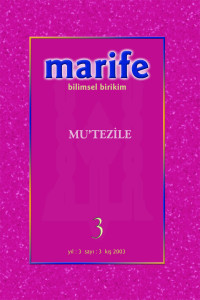Abstract
It’s known that knowledge activity of the Muslim philosophers is formed as three fundamental disciplines which is named as Kelam, Philosophy and Misticism. Among the disciplines in question, Kelam, which takes up the knowledge problem by putting forward a rational perspective and follows a close line to philosophy in this subject, takes an important place in the Islamic sciences system. It’s known that as a sistematic discipline, Kelam science, was developed by the Mu’tazilah scholars. So the basic concepts and definitions put forward about the knowledge problem are used then by Orthodox Kelam scholars. The Mu’tazilah scholars accepted that the human has senses, ratio and genuine information as three sources of knowledge. The Mu’tazilah scholars expressed that on acquiring knowledge there is no difference between senses, and they emphasized that similarity, difference and opposity states are comprehended with knowledge that acquired by senses. But they also expresed that the senses are not sufficient for comprehension of universals. The ratio which is seen as an important source of knowledge by Mu’tazilah, proves the truth of knowledge which has certainty. Also they advocated that with the ratio it is possible to reach the knowledge about God, and to make the good-bad distinction. The fact that the man who lives in a limited time span gets in touch with the past and the future, requires that the information as knowledge is to be accepted as a source of knowledge. This manner of Mu’tazilah who produced important ideas on determining the truth criteria of genuine information, shows the importance of informational knowledge for them. In particular, to preserve the basic principles of Islamic belief, makes necessary to test the Qoran and the fact of the Sunna in accordance with informational knowledge criteria.
References
- ........................................................................................................................................................................................
Details
| Primary Language | Turkish |
|---|---|
| Subjects | Religion, Society and Culture Studies |
| Journal Section | Research Article |
| Authors | |
| Publication Date | December 31, 2003 |
| Published in Issue | Year 2003 Volume: 3 Issue: 3 |
This work is licensed under a Creative Commons Attribution-NonCommercial 4.0 International License.

